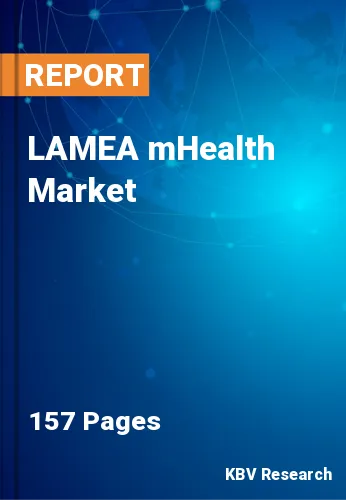The Latin America, Middle East and Africa mHealth Market would witness market growth of 32.4% CAGR during the forecast period (2020-2026). mHealth apps are expected to see a lucrative growth rate over the projected period due to strong consumer demand. Increased adoption of wearables by patients and the health-conscious population would also have a positive effect on the market. It has been observed that the majority of digital healthcare start-ups have adopted the B2C business model, which allows faster adoption compared to multi-stakeholder structures in the primary healthcare sector.
However, these B2C-focused start-ups are faced with profitability issues. For example, Clue, a Berlin-based start-up, provides customers with free fertility apps and obtains financing from various investors. Therefore, in order to sustain profitability, these mHealth players are beginning to concentrate on B2B2C-based market models, i.e. selling their products or services to business end-users, such as MedTech or healthcare IT providers, or directly to patients or physicians. Early-stage collaboration with these end-users will allow start-ups to gain insight into business opportunities and current scenarios.
In addition, start-ups can also focus on B2B business models involving hospitals, clinics, and other healthcare providers. Nonetheless, this model has a long revenue generation process and will be more challenging in the case of selecting an unsuitable partner. Compared to B2C and B2B, the B2B2C business model offers significant growth potential in the field of mHealth.
Based on Type, the market is segmented into Services and Devices. Based on Services, the market is segmented into Monitoring services, Diagnosis services, Healthcare Systems Strengthening Services and Others. Based on Devices, the market is segmented into BP Monitors, Cardiac Monitors, Pulse Oximetry, Blood Glucose Meters, Apnea & Sleep Monitors, Neurological Monitors, Wearable Fitness Sensor Device & Heart Rate Meters and Others. Based on Stakeholders, the market is segmented into Mobile Operators, Device Vendors, Healthcare Providers and Content Players. Based on Application, the market is segmented into Cardiovascular Diseases, Diabetes, Respiratory, Neurology and Other Applications. Based on countries, the market is segmented into Brazil, Argentina, UAE, Saudi Arabia, South Africa, Nigeria, and Rest of LAMEA.
Free Valuable Insights: mHealth Market in LAMEA is expected to register a CAGR of 32.4% during the forecast period (2020-2026)
The market research report covers theanalysis of key stake holders of the market. Key companies profiled in the report include Bayer AG, Medtronic PLC, Johnson and Johnson, Koninklijke Philips N.V., DexCom, Inc., Samsung Electronics Co., Ltd. (Samsung Group), Omron Corporation, AllScripts Healthcare Solutions, Inc., Sanofi S.A., Cerner Corporation.
Market Segmentation:
By Type
By Services
By Devices
By Stakeholders
Content Players
By Country
Companies Profiled
Our team of dedicated experts can provide you with attractive expansion opportunities for your business.

